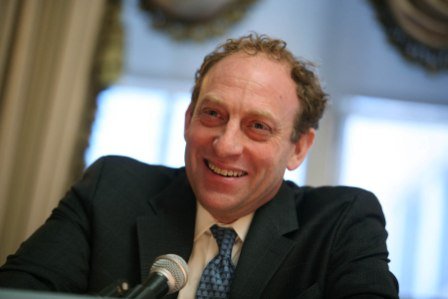2009 Scholarship Luncheon with Michael Oreskes, The Associated Press
February 13, 2009
“Those pronouncing the death of journalism are wrong,” said Michael Oreskes, managing editor of U.S. news for the Associated Press. Before an audience of nearly 200 assembled at the 2009 Overseas Press Club Foundation Annual Scholarship Luncheon at the Yale Club on Friday, February 13, 2009, he explained that in this age of information overload, only journalism can be charged with the vital task of “separating the wheat from the chaff and to see that the chaff is printed,” alluding to a comment originally made by philosopher Emmett Hubbard 100 years ago.
Oreskes maintained that while some may view that overload as a potentially fatal problem to journalism, it is “in fact, the opportunity that we as journalists cannot afford to miss, for our own sake and for the sake of democratic societies.” Although down in North America and Europe, the total circulation of paid and free newspapers is up around the world; he said, “there is compelling evidence that the appetite for knowledge and understanding of an increasingly tangled and complex world is as great or maybe even greater than it has ever been.”
But, while the future of journalism may be secure, there is a crisis for the current business model. The “old virtuous circle” of paid subscribers and advertisers paying to reach those readers to support news organizations is breaking down. The solution, he said: “We have to adapt.” He told the scholarship winners in the audience that they are at a competitive advantage in adapting to new media because they are, as Rupert Murdoch described, “digital natives,” at home in the new networked, linked-up, online, all-the-time world of the Internet. Describing himself as only an immigrant, he challenged the young journalists to discover new forms of journalism and new models for media businesses, while – critically - maintaining the core values of the profession. Even as change engulfs the industry, he insisted that journalists remain independent observers of the world or they risk, as the German media executive Mathias Dopfner warned, “committing suicide out of fear of dying.” Oreskes explained, “If journalists change so much we lose who we are we will be just as dead as if we had not changed at all.”
The thirteen 2009 OPC Foundation Scholarship winners who had just accepted their awards from representatives of the individual scholarships (see page xx) seemed eager to accept the challenge. The winners each had an opportunity to tell the audience something about themselves, their interests and career objectives. Besides a check for $2,000, the recipients also received a year free membership in the Overseas Press Club. Reuters hosted a reception honoring past and former winners of OPC Foundation scholarships the night before the luncheon at its headquarters in Times Square. The group met with veteran journalists in a morning program before the luncheon and later toured the Associated Press headquarters in the afternoon.
As master of ceremonies, OPC Foundation president William J. Holstein articulated the purpose of the scholarships as well as the Foundation’s mission. Recognizing that American news organizations are undergoing a profound transformation, he noted, “the entire profession finds it emotionally gratifying to see the spark in the eyes of these young people.” He added, “How else can we explain why so many people came to the luncheon at a moment of absolute despair in the industry.” The OPC Foundation gave a special scholarship this year honoring Fred Wiegold, OPC Foundation board member, who died suddenly last summer after falling ill in the newsroom at Bloomberg News where he was a senior editor and former New York bureau chief.
The 2009 winners - selected from a pool of 200 applicants from 50 different colleges and universities - came from Columbia University, New York University, Oxford University, University of California at Berkeley, University of Oregon, and Western Kentucky University. Five of this year’s winners also earned internships through the Foundation’s partnership relationships with the Associated Press, Reuters, and the South China Morning Post. The Foundation will pay for the recipients’ travel and living expenses for one month as they work in foreign bureaus. To obtain a program of the event, please email foundation@opcofamerica.org.

